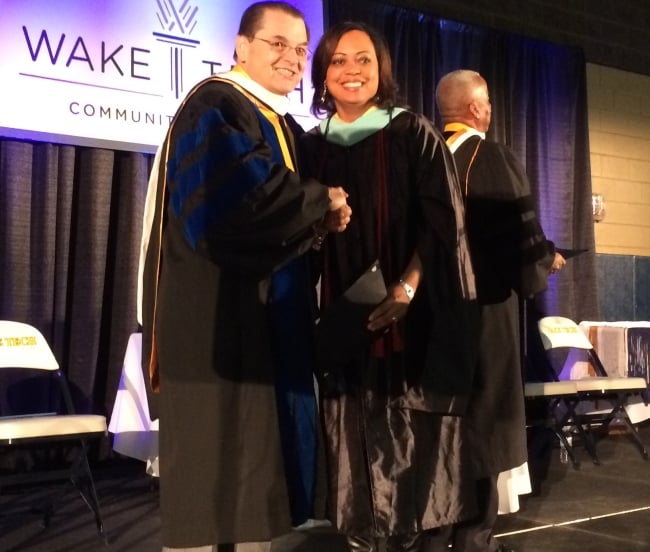You have /5 articles left.
Sign up for a free account or log in.

Wake Technical Community College President Stephen Scott congratulates an instructor promoted to a professor rank Thursday during an on-campus ceremony.
Wake Technical Community College
Many full-time community college instructors have similar academic pedigrees to their peers at colleges or universities, and have devoted decades to their students and institutions, but don’t get the prestige – or the pay bumps – that come with traditional academic ranks. At most community colleges, instructors remain instructors whether they’ve been there for 2 months or 20 years. But North Carolina’s largest two-year institution is breaking the mold, offering instructors the opportunity to apply for promotion to traditional academic ranks and the raises that come with them.
“It’s really a way to advance without going into the administration, and we also think it’s way to allow outstanding teaching and leadership to be recognized,” said Stephen Prescott, instructor of business law at Wake Technical Community College and co-president of its Faculty Association, a shared governance body.
Under the system, faculty who have been teaching full-time at Wake Tech for at least three years can apply for assistant professor. Those with five years at Wake Tech can apply for associate professor, while seven-year instructors can apply for full professor. The senior professor rank may be awarded to instructors after 12 years.
Beyond years of service, all applicants must show proof of “excellent” performance appraisals in all categories, including teaching and service. They must not be on probation or following any performance improvement plan.
Applicants must be recommended for promotion by their deans and department heads to a Faculty Rank Review Committee made up of an arts and sciences dean, a career programs dean, and three full-time faculty members who have achieved the rank of assistant professor or higher. (During the rank phase-in, through fall, the approving committee will include the associate vice president of arts and sciences and two curriculum deans.)
Each rank comes with a 3 percent raise, capping out at 6 percent. Faculty must wait two years after their first promotion before applying for the next rank.
In the first round of applications, open to full-time faculty who had taught at the college for 7 or more years, 258 instructors applied. The college promoted 30 to assistant professor; 128 to associate professor; 36 to full professor; and two to senior professor.
Last night, they were promoted – donning gowns and hoods – in a ceremony at the Raleigh campus.
Prescott plans on applying for promotion in the next round, this spring. He didn’t apply earlier, he said, because he didn’t want to be accused of being involved in designing something for his own benefit. A committee of other faculty members was responsible for crafting the promotion plan.
Geeta Shah, who’s taught economics full-time at Wake Tech since 2000 did apply, and was promoted to full professor. She said the new rank is a point of pride, but that she didn’t mind the raise, either.
“I love my rank – even if didn’t get that rank, I would have continued to teach because I love to teach, but, yes, I love it,” she said. “And I like the money. It’s an incentive. If you’re honest, you like both.”
Prescott said raises for longtime professors like Shah also will help reduce salary compression, when those who have been teaching at an institutions for many years are paid similarly to those just hired, because salaries haven't kept pace with the outside market. It’s big issue for more senior faculty, since North Carolina community college faculty don’t get step pay increases. At Wake Tech, the starting salary for an instructor with a Ph.D. is about $42,000. The average salary is $46,000.
President Stephen Scott said promotion system was an outgrowth of a faculty applied benchmarking project to improve the college’s performance.
“One of the needs that was identified was lack of a career path” for faculty who don’t want to become administrators, he said. And while faculty rank historically has been “driven by years of service,” he said, it was important to Wake Tech that promotion criteria were qualitative as well as quantitative.
“Our goal here is to be able to recognize our faculty and the work they’ve done over time,” he said, noting faculty and administrators designed their plan from the “ground up,” in a way that works for that institution. For example, he said, the college has funds to offer professors raises this year due to an enrollment boom. In other years, he said, faculty understand that it may not.
The total cost of the program was not immediately available.
The move drew mostly positive reviews from outside Wake Tech.
The ranks of assistant, associate and full professor traditionally are associated with the tenure track, said Greg Scholtz, director of academic freedom, tenure and governance for the American Association of University Professors, which includes community college faculty. Wake Tech’s plan doesn’t offer tenure (faculty at all North Carolina colleges work off of one-year contracts, which become renewable after three years for employees in good standing), or any extra assurances of academic freedom.
But at the same time, Scholtz said, faculty are getting better pay, and the plan appears to have come through shared governance channels – as faculty compensation plans should, according to AAUP standards.
David Baime, senior vice president for government relations and research for the American Association of Community Colleges, said via email that Wake Tech’s new policy already at institutions in a few other states, such as Illinois, Maryland, and Michigan (it’s extremely rare among North Carolina institutions). But even if it’s not unprecedented nationally, it still has “some real positives, especially in giving faculty motivation to get to the ‘next level,’” he said via email.









